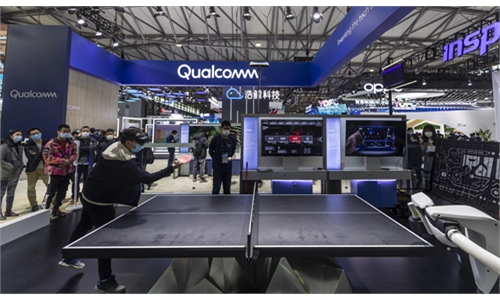Industry standards, underlying technologies still needed for further metaverse exploration in China: analysts

Photo:VCG
Despite the absence of a solid universal definition of metaverse, the buzzword in internet technology world in 2021, it is widely considered as the next evolution of the internet era. As it is so strategically important, central governments from a range of countries and major businesses including tech heavyweights and start-ups are betting on that the metaverse is set to be the next game changer.The latest move came as a metaverse consortium, founded by a major Japanese publication Nikkei Newspaper, with the support from the Japanese team of China-based AI start-up Xiaoice.
Xiaoice confirmed the partnership with the Global Times on Monday.
The consortium is supported by the Japanese Ministry of Economy, Trade and Industry to promote the construction of metaverse infrastructure.
"The consortium shed some light on the building up of metaverse ecosystem and infrastructure, which has no unified definition globally yet. It is necessary to conduct forward-looking integration to explore the issue based on real practice," Xiaoice CEO Li Di told the Global Times in an exclusive interview on Monday.
The counterpart of Xiaoice's main product - an AI being going with the same name in China -is known as Rinna in Japan, with the latter enjoying a market penetration ratio of around 20 percent in Japan, according to the company.
In China, a consortium similar to Japan's is likely to be founded in the near future, but experts said such a body should be mainly led by the government since the integration of government and businesses could better carve out a development path for the metaverse industry based on local conditions in China.
Generally taken as a virtual world in which people immerse themselves to both live and play, the metaverse is an extension of applications seen in the gaming and social networking fields.
"There are many elements in metaverse that need to formulate relatively unified rules, and the metaverse industry must be standardized according to the principles of government policies," Pan Helin, joint director of Research Center for Digital Economics and Financial Innovation affiliated with Zhejiang University's International Business School, told the Global Times on Monday.
"In China, the formulation of standards requires efforts of both government and internet firms based on the national conditions. And only under the framework of rules, can the domestic metaverse industry make sustainable progress," Pan noted.
China has a metaverse industry group - the Metaverse Industry Committee under the China Mobile Communications Association (CMCA) - which was unveiled in November last year, marking an important first step for the country's pursuit of the healthy and sustainable development of the metaverse sector.
As the only national industry organization in the field of Chinese mobile communications industry, CMCA's members include state-run industry conglomerates such as China Mobile and China Unicom.
In February, the state-backed body's metaverse committee added another 17 companies, bringing it to a total of 112 companies or individuals in the industry body.
Own avatar
At present, governments and companies across various countries are rapidly developing the metaverse, but specific problems and solutions are still being explored including industry standards and underlying technology solutions.
Despite the inevitable hype in the stock market surrounding the concept, China is weighing the next big thing that's far beyond the current focus on virtual reality (VR) and online gaming, Chinese leading industry voices told the Global Times.
Xiang Anling, a PhD candidate from the School of Journalism and Communication of Tsinghua University, said that among different segments across the metaverse ecosystem, China has more of voice in the virtual digital human sector in terms of standard formulation.
The ITU Telecommunication Standardization Sector (ITU-T) recently officially "froze" or completed two digital human standards led by the Cloud Computing and Big Data Research Institute of China Academy of Information and Communications Technology, which showed China's evaluation ability in the field of digital human has been internationally recognized, paving the way for China's digital human technology, products and evaluation to go abroad.
"In comparison with the industrial metaverse, an ecosystem in which new information and communication technologies were represented by the Internet of Things, AI and others, in which sector the West has more clout in leading its early development, China has presented advantages in the virtual human industry with more innovative products put onto the market and more new firms mushrooming," Xiang, who's also the executive deputy head of the research institute affiliated with Qingbo, a Beijing-based big data and AI services provider, told the Global Times on Monday.
Considered a core element of the metaverse, the virtual digital human market size is forecast to reach 270 billion yuan ($42.58 billion) by 2030, according to an industry report released by QbitAI, an industry services platform focusing on AI and cutting-edge technology.
The virtual digital human industry has seen broad applications in China in such sectors as broadcasting, entertainment, retail, finance and education, and it is possible that everyone will have their own avatar someday in the future.
Taking the Xiaoice AI being as an example, it focuses on more than 10 verticals such as finance, intelligent vehicle, retail, sports, textile, real estate and cultural travel. Over 60 percent of worldwide AI-human interactions are conducted using Xiaoice's technology, according to the company.
Smart assistants belonging to third-party devices like Chinese tech giants Huawei and Xiaomi devices have been featured with Xiaoice, as do in-car systems for a number of Chinese automakers.
"Xiaoice has its own underlying technologies from the very beginning, which is important to the long-term development," Li said, pointing out that technical limitations are one bottleneck facing China's metaverse development, particularly underlying architectural information technologies such as mobile communications, big data and AI, which needs to strengthen basic research and enhance technological innovation capabilities.




